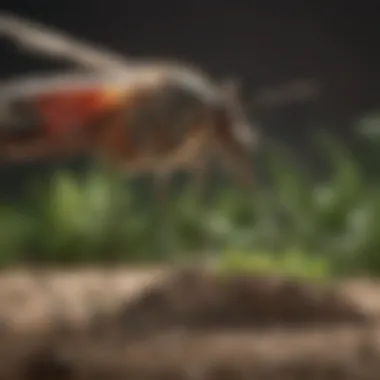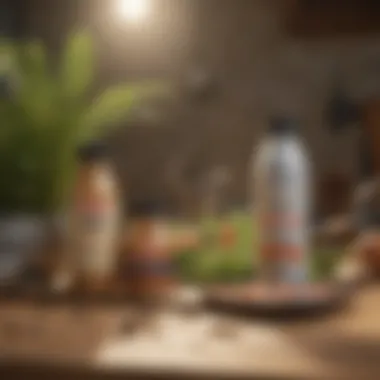Natural Ways to Get Rid of Mosquitoes in Your Yard


Intro
Creating a mosquito-free yard involves more than just wishful thinking. It necessitates practical, actionable solutions that not only diminish mosquito populations but also respect the environment. Mosquitoes are not only a nuisance but are also vectors for various diseases, making it important to manage their presence effectively. This article presents various home remedies that address this concern with natural, eco-friendly methodologies.
The methods explored here utilize common ingredients and simple techniques to dissuade these pests from taking up residence in your outdoor areas. By leveraging natural components, such as essential oils and household items and understanding their effectiveness, you can take comprehensive steps to enjoy your yard without the constant threat of mosquito bites. Let's dive into effective remedies you can easily apply, understanding both their benefits and limitations, thereby ensuring a good balance with the surrounding ecosystem.
Recipe Highlight
Nature’s Mosquito Repellent
This featured recipe employs essential oils known for their mosquito-repelling properties.
Essential Ingredients:
- 10 drops of lemon eucalyptus oil
- 5 drops of lavender oil
- 5 drops of tea tree oil
- 1 cup of carrier oil (such as coconut or olive oil)
- A spray bottle
Preparation Time: Approximately 10 minutes
Yields: About eight ounces of mosquito repellent spray.
Step-by-Step Instructions
To create your own mosquito-repelling spray, follow these instructions:
- In a clean bowl, combine lemon eucalyptus, lavender, and tea tree oils.
- Slowly mix in the carrier oil to dilute the essential oils, which is crucial for skin application.
- Once thoroughly mixed, transfer this blend into the spray bottle.
- Shake the bottle before each use to ensure the oils are well distributed.
- Apply the lotion to exposed skin before entering areas known for high mosquito populations.
Cooking Techniques:
Ensure not to rush through mixing ingredients. All components should be blended thoroughly to create a potent repellent.
Insider Advice:
Using strong essential oils increases efficacy but always test a small skin patch to avoid allergic reactions.
Variations and Substitutions
If specific oils are unavailable, here are alternatives:
- Replace lemon eucalyptus with peppermint or citronella oil.
- Use almond oil as a substitute for carrier oil if available.
You can also enhance the aroma by mixing in a few drops of patchouli or rosemary oil for an additional layer of scent.
Time-Saving Cooking Tips
To streamline the process, consider the following tips:
- Measure oils ahead and prepare multiple batches to save time later.
- Use a funnel for easy transfer of the mix into the spray bottle.
- A label can be helpful, placed on your spray bottle, to remind you of the contents.
Nutritional Information
While this recipe is not for consumption, the oils used boast several benefits:
- Lemon eucalyptus is noted for its repelling qualities against mosquitoes.
- Lavender offers calming effects and can help with skin irritations post-bite.
- Tea tree oil acts as an antibacterial agent, useful for emergency skin care.
Each application does not come with direct nutritional content, but it stands conducive toward outdoor comfort. This remedy is applicable in varied settings: gardens, backyards, or outings ensuring the pain of mosquito bites stays away, within vegan and natural wellness approaches.
Lastly, you can find additional information on mosquito behavior and control on resources like Wikipedia, Britannica, and active communities on Reddit.
Preface to Mosquito Control
Mosquito control is an essential topic for anyone looking to create a comfortable outdoor space. Understanding how to combat these small, irritating insects can greatly enhance your time spent in your yard. Mosquitoes not only disrupt outdoor activities but also pose health risks through disease transmission. This section emphasizes developing a strategic approach to controlling their population, providing you with effective tools and knowledge.
Understanding Mosquito Behavior


To successfully manage mosquitoes, it is critical to understand their behavior. Mosquitoes are typically drawn to areas with warm temperatures, stagnant water, and ample shade. They are most active during dawn and dusk when humidity levels rise. Spaces with dense vegetation offer shelter and breeding grounds, which underscores the need for regular monitoring. Certain mosquitoes prefer to feed on humans over animals, increasing their presence in residential locations.
– **Key attractants to mosquitoes:
- Carbon dioxide: Humans exhale it, making them more attractive.
- Body warmth and sweat: Both can lure mosquitoes from a distance.
- Floral scents: Some fragrances are particularly attractive to female mosquitoes seeking hosts for feeding.**
Understanding these behaviors allows homeowners to make informed decisions on what measures can be most effective in disrupting the mosquito life cycle—thus ensuring you can regulate their number in your yard effectively.
The Importance of Yard Maintenance
A well-maintained yard is essential for reducing mosquito populations. Regular upkeep can help eliminate possible breeding sites. Mosquitoes breed in stagnant water, which can accumulate in various areas. This can include bird baths, clogged gutters, or even old tires left in the backyard.
For effective yard management:
- Remove items that collect water: This includes flower pot saucers and any outdoor storage that can trap rainwater.
- Maintain a trimmed landscape: Longer grass and dense foliage can create more shaded areas where mosquitoes feel safe and breed. Regular mowing and pruning help minimize these spaces.
- Use mulch properly: While mulch can offer a habitat for some wildlife, ensuring it does not hold excessive moisture can lessen the allure for mosquitoes.
Adhering to proper maintenance routines provides a dual benefit: not only does it create a beautiful lawn, but it also effectively disrupts the mosquito lifecycle, reducing the chance of their presence in your outdoor areas.
Home Remedies for Mosquito Control
The prevalence of mosquitoes in outdoor spaces can affect the well-being of individuals and families. Mosquito bites can harm health and ruin outdoor enjoyment. Consequently, the relevance of home remedies for mosquito control cannot be understated. These methods offer a natural alternative to chemical repellents, aligning with a more eco-friendly approach. Home remedies help reduce the adult mosquito population while also targeting their breeding sites. Affordability and ease of access make them attractive solutions for many homeowners.
Essential Oils and Their Effectiveness
Essential oils provide a potent and appealing method for deterring mosquitoes. Many of them possess qualities that either repel these insects or disguise the scents that attract them. This makes essential oils desirable options for those seeking to keep their yards mosquito-free.
Properties of Citronella
Citronella is notably recognized for its effective mosquito-repelling properties. This oil is extracted from the leaves and stems of the Cymbopogon nardus plant. Its potential to mask the scents that attract mosquitoes plays a crucial role in its function. Additionally, citronella is a popular choice due to its pleasant scent, which many humans find enjoyable. However, its effectiveness might dissipate after a short time, requiring frequent reapplications.
Benefits of Lavender Oil
Lavender oil offers more than just a pleasant fragrance. Its mosquito-repelling qualities arise from its natural components, such as linalool. These constituents interfere with the sensory reception of mosquitoes. Consequently, utilizing lavender oil is an appealing choice for individuals wanting to combine aroma therapy with pest control. Nevertheless, while the scent is calming for people, its effectiveness against mosquitoes might be limited when faced with significant populations.
Tea Tree Oil Applications
Tea tree oil is renowned for its antimicrobial properties, but it also acts as a mosquito repellent. The active compounds in tea tree oil disrupt the respiratory system of mosquitoes, leading to their avoidance of treated areas. Using tea tree oil can be approachable due to its stores availability in most health shops. However, a drawback is that tea tree oil can cause skin irritation when used undiluted. This makes careful application paramount.
Vinegar as a Repellent
Using vinegar as a mosquito repellent demonstrates an example of promptly accessible resources' power. Vinegar functions not only as a culinary staple but also possesses qualities that deter mosquitoes. Understanding its types and application techniques is critical for maximizing its effectiveness.
Types of Vinegar
Apple cider vinegar and white vinegar are two commonly utilized options cared for mosquito control. Each type includes acetic acid known for inhibiting mosquitoes' attraction. The distinct odor arising from vinegar choices can repel mosquitoes. However, the strong scent may be off-putting for some individuals, which limits practical exposure in community settings. Thus, although both achieve deterrence, personal preferences play a role.
Application Techniques
To utilize vinegar effectively, creating a simple spray solution can improve current deterrents against mosquitoes. Mix equal parts of vinegar and water in a spray bottle, and apply to areas where mosquitoes gather. Pay attention, as frequent reapplication can be necessary, especially after wet conditions. Additionally, finding articulated spots can enhance efficacy through targeting resting places or pathways for the mosquitoes.
Garlic and Its Mosquito-Repelling Qualities
Garlic contains components that create an unfriendly environment for mosquitoes due to its overpowering smell. Both application preparation and competitive efficacy draw interest from readers seeking natural solutions.
Preparation and Usage
Garlic is easy to prepare as a shield against mosquitoes. Crushing a few cloves and mixing them with water creates a simple spray or soaking into skin is advisable. Its widespread availability makes garlic a highly accessible solution; yet, the distinct smell can deter humans as much as it interprets its aroma to repulse mosquitoes.
Efficacy Compared to Other Remedies
Many users have reported garlic's effectiveness, making it as worthy candidate as compared to other natural repellents such as citronella. Further, participants using garlic-based solutions noted varying results; in some contexts, mosquitoes were markedly less present. Yet, there also exists a hurdle: some may need to apply garlic constantly to maintain its efficacy over enduring mosquito exposure.
Use of Eucalyptus Oil


Eucalyptus oil serves an essential function within the world of natural mosquito control. Its characteristics offer advantages for effective use, but there are specific considerations to observe.
Different Forms of Eucalyptus
Eucalyptus trees possess several variants. The most popular for repellent purposes is Eucalyptus citriodora, known for its solid scent and protective properties. The oil extracted can also exist in diluted formats like sprays or lotions. However, not every variety produces similar effects.
Recommended Concentration Levels
Ailment specificity in eucalyptus oil allows it to operate best at specific concentrations. It is often recommended to start with diluted forms rather than applying concentrated oil directly to the skin. For instance, a 10-15% dilution is usually adequate sauce to deter mosquitoes effectively. This makes it comfortable though sensible to monitor personal reaction to avoid irritations that accompany the concentrated liquid.
Natural solutions serve as useful tools to eliminate mosquitoes. Bee smart with essential oils and vinegar for impactful results.
By considering these methods, one equips oneself with knowledge essential for maintaining a mosquito-free yard. Access to beneficial home remedies can significantly empower readers towards effective use in distinct settings.
Plant-Based Solutions
Plant-based solutions form an integral part of natural mosquito control methods. Utilizing specific plants not only enhances your yard's aesthetic appeal but also incorporates effective mosquito deterrents. These solutions offer ecological benefits, reduce chemical usage, and promote biodiversity in your outdoor spaces. Here, we discuss different types of plants known for their mosquito-repelling properties.
Mosquito-Repelling Plants
Marigolds
Marigolds are effective in deterring mosquitoes primarily due to their strong scent. This aroma is unpleasant for mosquitoes, making them less likely to inhabit areas where these flowers are present. They are popular among gardeners because they are easy to grow and require minimal care. A unique component in marigolds, called tagetes, contributes to their insect-repelling characteristics.
However, it is worth mentioning that while marigolds can repel some types of mosquitoes, they may not be fully effective against all species. Incorporating them into your yard can still enhance its vibrancy.
Mint Varieties
Mint varieties are cherished not only for culinary purposes but also for their ability to repel mosquitoes. The oil derived from mint leaves contains menthol, which effectively disrupts the detection of carbon dioxide that mosquitoes rely on. Installing pots of spearmint or peppermint near outdoor seating areas can provide both sight and smell advantages.
There are several mint varieties to choose from, giving the garden a wonderful aroma. However, mint can spread rapidly if not contained properly. This makes practice necessary when planting it in a garden.
Basil Proximity to Outdoor Living Spaces
Basil's role as a mosquito repellent adds great value to outdoor living spaces. Its aromatic scent serves to chase away these pests. Placing pots of basil around patios or decks will help in creating a more pleasant experience while outside. Furthermore, fresh basil can also enhance any meal prepared outdoors.
The capacity of basil to thrive in sunny conditions makes it attractive for this purpose. Notably, not all types of basil are equally effective. The Thai basil and sweet basil are particularly beneficial in warding off mosquitoes. However, care must be taken to ensure that these plants are well-watered and healthy, as stressed plants can lose their repelling properties.
Creating Your Mosquito-Repellent Garden
Creating a valley of non-mosquitoes begins with appropriate planting strategies. Choosing the right mix of mosquito-repelling plants to surround living spaces needs to be a consideration.
Planting Strategies
A good planting strategy consists of arranging mosquito-repelling plants in locations where people gather. This could mean placing pots of mint and basil near outdoor dining tables or along pathways within gardens. Mixing these plants with conventional landscaping can yield an inviting atmosphere. Many plants require regular trimming or spacing consideration to prevent plant competition for sunlight, both are also strategies for maintaining overall plant health.
Additional benefits arise from layering different plant heights. This plant layering technique add diversity to the garden layout, further enhancing both visual appeal and effective mosquito control.
Maintenance Tips for Longevity
Maintenance grows significantly in importance when working with mosquito-repelling gardens. Regular watering, mulching, and timely pruning will contribute to better plant health and longevity in affecting mosquito behavior. Each plant possesses various water and sunlight preferences, making it necessary to research this information for the plants chosen.
It's also prudent to layer mulch around these plants as it retains moisture and reduces competition from weeds. With proper attention to these maintenance tips, the mosquito-repelling plants can significantly enhance outdoor experiences without using harsh chemicals.
Effective integration of plant-based solutions can align with stress-free connections with nature while maintaining a mosquito-free ambiance.
Preventive Measures
Effective elimination of mosquitoes goes beyond home remedies. Preventive measures are key to maintaining a mosquito-free yard. This approach not only focuses on reactive solutions but also includes proactive steps that significantly reduce habitat for these pests. Implementing preventive actions before mosquito populations flourish is typically more effective, and it stresses the significance of diligence in your outdoor spaces.
Eliminating Standing Water
Common Sources of Standing Water


Standing water is the ideal breeding ground for mosquitoes. Identifying common sources in your yard plays a pivotal role in controlling their population. Most individuals overlook spots like clogged gutters, birdbaths, or even plant pots holding excess water. Each of these sources can serve as a sanctuary for mosquito larvae.
Additionally, discarded items such as tires and containers can accumulate rainwater and create perfect conditions for breeding. The simplicity of addressing these sites makes it an excellent choice in our quest for effective mosquito control. By mitigating standing water, one may substantially lessen reproductive cycles of mosquitoes.
Regular Maintenance Schedule
Adopting a regular maintenance schedule is essential for keeping your yard less inviting to mosquitoes. Consistency is a cornerstone in this aspect. It involves inspecting potential sources of standing water on a weekly basis. Ensure to promptly drain or clean areas that may collect water, such as rain gutters or flower pots. This scheduled upkeep serves multiple functions, not solely targeting mosquitoes.
By creating a habit, property owners will develop a keen eye for changes in their surroundings, thus minimizing areas for development of mosquito populations. The unique advantage of a maintenance schedule is that it promotes awareness of conditions that may otherwise go unnoticed.
Using Mosquito Traps
Types of Traps
Various types of mosquito traps available can aid significantly in controlling populations. Carbon dioxide traps mimic human breathing, effectively attracting mosquitoes. Sticky traps capture these pests on a peculiar adhesive surface. Each model operates on distinct principles but shares the common goal of reducing mosquito presence.
Adopting such traps presents a solid choice in combating mosquitoes. In a world of eco-friendly preferences, the non-chemical means of trapping aligns with efforts to deter populations responsibly. However, it requires correct placement and optimal conditions to maximize effectiveness.
Effectiveness and Best Practices
The effectiveness of mosquito traps hinges on strategic placement, as traps should be situated where mosquitoes commonly gather. Best practices entail keeping traps clean and ensuring they are filled as necessary to avoid a drop in efficiency.
Understand that relying solely on traps may not eliminate the problem entirely. Instead, use them as part of a broader system within an integrated approach. This reality means that while mosquito traps are useful, maintaining vigilance over potential breeding sites remains indispensable. Thus, combining methods yields the best results in curbing mosquito growth.
Safety Considerations
The utilization of home remedies for mosquito control necessitates a focus on safety considerations. These methods often involve natural ingredients; yet, it is essential to evaluate their safety for human interaction and the environment. Ensuring the safe use of these remedies not only protects you and your family but also preserves the delicate ecosystem around your home.
Toxicity of Common Ingredients
Evaluating Risks
When evaluating risks associated with mosquito remedies, it is crucial to consider the substances involved. Certain natural ingredients, while effective, may still pose a health risk if improperly used. For instance, essential oils can be potent, warranting careful dilution before application. Common ingredients such as citronella and eucalyptus are known for their repellent qualities but can cause irritation in sensitive individuals. Assessing the specific characteristics of these products helps in making informed decisions regarding their application. The more cautious a user is, the more beneficial this segment of evaluating risks becomes overall.
Safe Usage and Application Guidelines
Safe usage and application guidelines are pivotal for ensuring that home remedies are both effective and non-harmful. Each remedy should state proper dilution and method of use clearly. For instance, essential oils should generally be mixed with a carrier oil before direct application on the skin. Understanding these guidelines decreases the possibility of adverse reactions. This segment possesses dual benefits of protecting user health and maximizing the effectiveness of the remedy.
Environmental Impact of Remedies
Balancing Effectiveness and Safety
The balance between effectiveness and safety is a fundamental aspect of mosquito control remedies. While one may be tempted to employ highly effective chemicals, their safety profile may not hold up, raising concerns of toxicity. Many eco-conscious users benefit significantly when they can identify remedies that offer satisfactory results without compromising their family's health or the surrounding ecosystem. Thus, prioritizing ingredients that are known for the benefits without extensive negative effects solidifies the importance of this balance in whichever methods chosen.
Long-term Ecological Considerations
Long-term ecological considerations play a significant role in maintaining a sustainable environment while controlling mosquito populations. Intensive use of any substances, even natural ones, can lead to unintended consequences for local wildlife. It's important for each person evaluating these methods to assess their impact on the surrounding flora and fauna. A cosmetic understanding, rather than a superficial view, enhances the relationship we have with our ecosystem. Engaging in practices that minimize harm contributes not only to immediate effectiveness but also sustains our outdoor area for future enjoyment.
Understanding safety considerations and evaluating both the risks and impacts profoundly shapes the choices involved in mosquito control.
Culmination: Sustainable Mosquito Control in the Yard
Sustainable mosquito control is essential, especially for those who want to enjoy their outdoor spaces without the annoyance of bites. The combination of eco-friendly solutions, preventive measures, and practical remedies can minimize mosquito populations efficiently. The methods discussed in this article provide a comprehensive approach that respects the environment while achieving the goal of a mosquito-free yard. By employing these techniques, one can engage in outdoor activities comfortably and safely.
Summary of Effective Methods
To alleviate mosquito problems, a summary of strategies examined includes:
- Essential Oils: Utilizing oils like citronella, eucalyptus, and lavender. These can repel mosquitoes without harmful chemicals.
- Vinegar Solutions: Applying vinegar, particularly apple cider or white vinegar, can deter mosquitoes via smells that they dislike.
- Garlic Repellents: The strong odor of garlic can act as a natural barrier against mosquitoes.
- Plant-based Strategies: Having plants such as marigolds and mint can create a natural repellent environment.
- Standing Water Management: Regularly eliminate sources of standing water where mosquitoes breed, highlighting the need for maintenance.
Incorporating these methods into a consistent mosquito control plan can greatly reduce their presence.
Encouraging Eco-Friendly Practices
Promoting environmentally friendly practices in mosquito control is imperative for long-term solutions. Here are some ways to encourage such practices:
- Educate About Habitats: Recognizing how important natural habitats are for various wildlife can create awareness about maintaining a balanced ecosystem.
- Support Native Plants: Promote the use of native plants for mosquito repelling. They are adapted to local conditions and require less water and maintenance.
- Advocacy for Safe Practices: Encourage the use of non-toxic substances and safe application guidelines to mitigate the impact on beneficial insects and surrounding wildlife.
Choosing these eco-friendly practices not only helps manage mosquitoes but also contributes to healtier ecosystems. It establishes a proactive stance toward gardening and yard management that respects nature.
The integration of natural methods fosters sustainable living and offers practical solutions while aligning with the principles of environmental stewardship.







